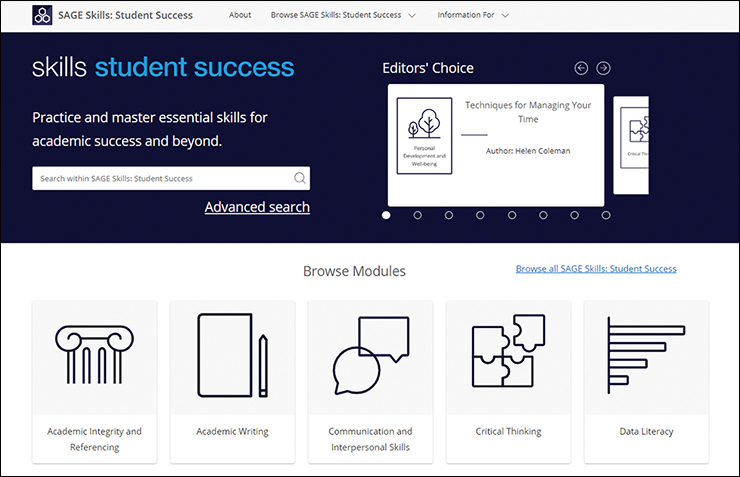Sage Skills: Student Success | eReview
SAGE Skills: Student Success is an excellent resource for institutions supporting undergraduate education and returning or nontraditional students looking to refresh their skills.
SAGE Skills: Student Success Sage
CONTENT SAGE Skills: Student Success promises to help students “practice and master essential skills for academic success and beyond.” The suite offers several modules designed to aid students in self-directed learning across more than 1,100 topics to equip them for success. Content is curated by editors with the aim of providing users with the relevant skills and knowledge for today’s educational and professional realms.
The collection is organized around 10 comprehensive modules: academic integrity and referencing; academic writing; communications and interpersonal skills; critical thinking; data literacy; diversity, bias, and impacting change; information literacy; personal development and well-being; research skills; and study strategies and assignments. These modules serve as a source of information for self-guided learning, as well as a resource for campus partners, such as tutoring centers and student success programs, to support personal enrichment and learning beyond the classroom with unlimited simultaneous access and the ability to integrate content into LibGuides, learning management systems, and/or websites.
With interactive scenarios, self-guided assessments, videos, exercises, reference documents, and real world–based content, the modules target different learning modalities to empower students to put their lessons into practice. Part of the SAGE Recommends platform, Student Success serves as a jumping-off point to access relevant SAGE resources, including journals, books, cases, reference, and video content (where available).The collection is available for subscription or perpetual purchase; new content is planned for future release. Other SAGE Skills products include SAGE Skills: Business.
USABILITY SAGE Skills: Student Success is designed with ease of use in mind. The interface is clean and easy to browse or search. Users can access the simple search from the landing page or click through to access advanced search. They can also access the 10 main modules through a graphical menu on the collection’s main page. A brief description of each module appears when users hover over the selected menu tile; alternately, users can browse the entire collection, which currently includes 94 individual items. These include materials across all content types (books, reference, cases, skills, and videos), and can be filtered by type, discipline, works and sections, and publication date, or limited to content available to the user based on their institution’s license.
In keeping with the modules, items in the browse and/or results list are marked by an icon that shows the module associated with the resource and details on the author, publication date, content type(s), and a brief abstract. Individual “skills” resources include a linked table of contents to guide the user from one section to the next, along with links to relevant “skills” available in the collection, a brief bibliography of suggested readings, and links to additional SAGE resources where available. For users unsure where to start, a self-assessment is available for each module and skill to maximize the overall use of the collection.
PRICING Libraries may lease or purchase SAGE Skills: Student Success based on their institution type and size. For the U.S., an annual subscription ranges from $2,500 to $24,000. For perpetual purchase, the price starts at $12,000.
VERDICT With a number of skills-based modules on a range of subjects, SAGE Skills: Student Success provides easy-to-access, quality content that can readily supplement introductory course readings or serve as a tool for the development of badging programs and extracurricular learning. The availability of subscription and perpetual purchase models makes it an attractive option for institutions with different budget considerations. Overall, an excellent resource for institutions supporting undergraduate education and returning or nontraditional students looking to refresh their skills. Additionally, a helpful resource for cross-campus collaboration.
RELATED
ALREADY A SUBSCRIBER? LOG IN
We are currently offering this content for free. Sign up now to activate your personal profile, where you can save articles for future viewing










Add Comment :-
Comment Policy:
Comment should not be empty !!!